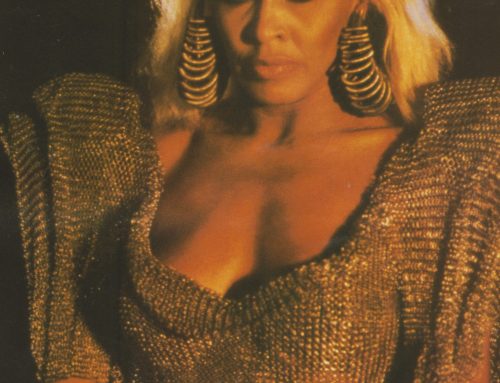2021 Introduction: A semi-finalist up for induction into The SoulMusic Hall Of Fame ‘Lifetime Achievement’ category, the multi-talented Roy Ayers with six decades of recording and performing to his credits, has close to 40 albums to his credit and in recent years, his classic tracks have been consistently sampled by rap and hip-hop artists….
Roy Ayers: Everybody Loves The Sunshine
September 1976 interview
By David Nathan
Roy Ayers been in the biz for over three decades and right now he’s enjoying more success than ever. Black music is the heart of American music, he says, and he’s sure helping keep that heart pulsating.
“I FEEL like I’ve been involved all my life. Thirty-five years in the business — and it’s been very fruitful!” So speaks Mr. Roy Ayers, currently enjoying more success than ever via his live appearances and his latest album for Polydor, “Everybody Loves The Sunshine”.
Incredibly, Roy says, this must be his eleventh or twelfth for the label. It’s incredible simply by virtue of the fact that Roy has been with Polydor since 1970 and his rise to fame has hardly been what one might term meteoric. Roy, of course, has his own comments. “My whole involvement in the business has been enlightening. I’ve been able to equate my experiences with my peers — people like Herbie Mann, Herbie Hancock, Gerald Wilson and so on — the list is endless. I’ve learned so much from them. And then, I would have to say that within the last five or six years, the whole concept of business has really come to my attention. This is a business — it’s easy for an artist to become more oriented towards music and forget. But you must be aware, because otherwise you can become a victim of circumstances. You have to prepare yourself to become a professional musician and a businessman. Naturally, you’re always going to have obstacles but you have to ensure that your business involvement doesn’t take away from your creativity. It really doesn’t have to.”
Roy cites the fact that he’s had nine managers since 1970 — and now handles the function himself with the aid of fellow artists Edwin Birdsong. “Some of those guys (the managers) were just not able to deal with it. I feel that management is important for the individual who needs it. Over those years, I talked with some of the most successful and some of the least successful and naturally, I reached certain conclusions. Like a manager’s function is to manage his artists’ affairs. The artist should be allowed to be totally into their music if they have a good manager. They should learn and grow together and a frequent problem is that managers do not always believe in their artists totally. And to bring the best results, you’ve got to have the combination of record company, management and booking agency working with you.”
Speaking about his record company, Roy is emphatic. “The company has simply been asleep on me for some time. They are now growing and awakening. But it’s true to say that they will sleep on you, if you allow it to happen. During the years since I joined the company in 1970, I’ve seen people come and go. Groups like Mandrill, who are really good. And in that time, I’ve had to work with four different regimes at Polydor! That means four presidents, four changes of staff. With each new regime, new verbal promises were made. Fortunately, I saw my sales maintain despite the changes but nothing really dramatic changed. So our contract was re-negotiated — but the problem was always the lack of money budgeted for adequate promotion. And without proper management and an attorney who was also learning the business as we went along, we couldn’t go in there and fight the way I wanted. I would say that my career has been in limbo for five years. Now, we’re doing everything primarily alone. With “Mystic Voyage” we really started to pick up. It must have sold some 250,000 copies. Now, we’re working a lot on our own. We have independent promotion men working with us, making sure the records are being played. This year I’m told I’m now a ‘priority’ artist and I feel that with the right treatment, things will really happen in a big way.”
The first indications are that Roy’s current album and his new single from the set (“The Golden Rod”) have both been leaping up the US charts, with the album doing particularly well on the pop charts — a very important and tangible sign of change. “Yes, it’s still a business,” Roy remarks, “but you don’t let that affect your musical creativity. Whenever I get into the studios, I say that whatever I do will sell a million or more. That’s my intention! But I have a ‘take it or leave it’ attitude. Like when Herbie (Hancock) did so well with “Headhunters” people said he sold out. To me, he sold in! Versatility is the key. You have to give the public what it wants, you have to be a realist. Time brings about a change and you go through a constant process of checking out your music, seeing what the public digs.”
Harkening back briefly to the theme he touched on earlier, Roy says that the conflict between an artist and the “business” side of things can “crush an individual and his art. The love and sincerity that a musician puts into his music can be suppressed by the industry. Artists have become just product now and they’re the ones that are forming the multi-million dollar corporations. The profits from their sales keep companies alive. And yet thinking back, there are so many innovators who never received the acclaim. John Coltrane is a prime example. He was dedicated. But you have to be dedicated and still feed your family. By rights, someone like John should have had the acclaim that the Beatles got for his contribution to art.” Roy says that working with Herbie Mann between 1966 and 1970, he learned a good deal about commercialism “how it works, what’s involved.” Mr. Ayers is confident about the future. “There’s a new breed of musicians coming up. Spontaneous guys. But guys who know where that whole business thing is at. I feel that black music is unquestionably the foundation for America’s music — it’s the heart. And gradually, that’s becoming more and more evident.”
As part of that heart, with the talent that Mr. Ayers seems to be continually expressing as a writer, producer and above all musician par excellence and his obvious head for business and organising his own career, it’s no surprise to learn that he feels he’s reached “the turning point. I feel I’m on the threshold.”
{“preview_thumbnail”:”/sites/classicsoul.rock.tools/files/styles/video_embed_wysiwyg_preview/public/video_thumbnails/ue1v0o9_hJM.jpg?itok=kOuA9SxA”,”video_url”:”https://youtu.be/ue1v0o9_hJM”,”settings”:{“responsive”:1,”width”:”854″,”height”:”480″,”autoplay”:0},”settings_summary”:[“Embedded Video (Responsive).”]}
{“preview_thumbnail”:”/sites/classicsoul.rock.tools/files/styles/video_embed_wysiwyg_preview/public/video_thumbnails/BYU7_Pu0mQQ.jpg?itok=QAWKYtXs”,”video_url”:”https://youtu.be/BYU7_Pu0mQQ”,”settings”:{“responsive”:1,”width”:”854″,”height”:”480″,”autoplay”:0},”settings_summary”:[“Embedded Video (Responsive).”]}





